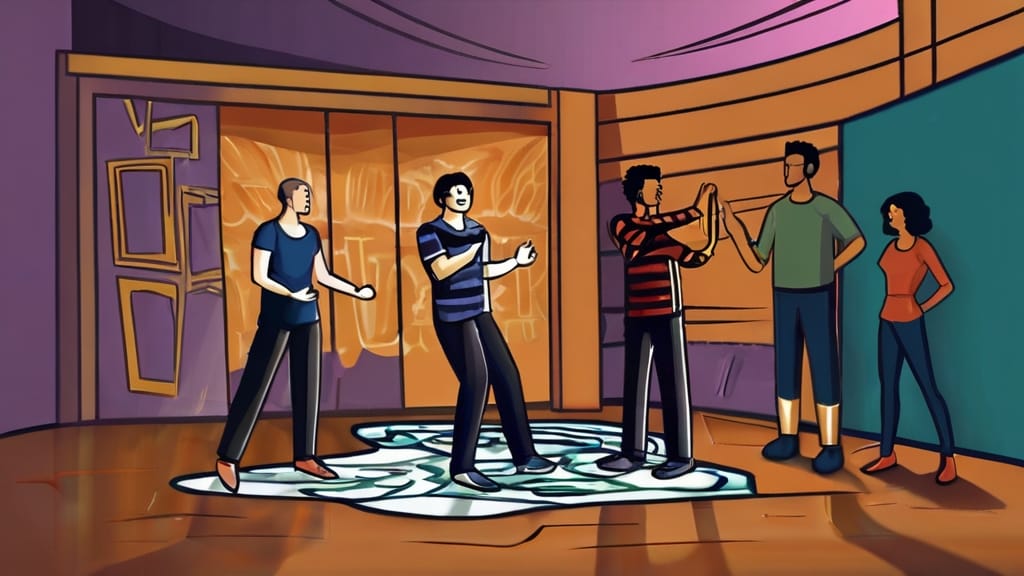Where we explore three key improv skills for work: active listening, creativity, and creating a supportive environment.
Ever watch a colleague handle a tough situation with impressive composure, while others seem to melt under pressure? Their secret weapon might surprise you: improv comedy.
Yes, the same improv you might associate with wacky costumes and hilarious games on TV! But here’s the thing: the skills honed on the improv stage translate so well to our modern, ever-changing world of work. Not only has improv been shown to provide general life benefits such as reducing social anxiety and building confidence, but it can also bring other benefits to our working life.
So, let’s dive into three key improv skills for work that you can use to transform your work life, backed by research…

1. Active Listening and Communication: The Art of Truly Being Heard
In improv, truly listening to your scene partner and responding based on understanding is essential. Imagine a scene where one person keeps talking about their pet goldfish, while the other keeps trying to discuss a missing diamond necklace. It might be initially funny, but there’s nowhere for the scene to go… The same goes for work.
Active listening is the foundation of effective communication, as Gardner et al. (2019) point out. By focusing on what your colleagues are saying, asking clarifying questions, and showing genuine interest, you can dramatically improve communication across the board.
Taking Action: Challenge yourself to become a listening ninja! During your next meeting, ditch the multitasking and truly focus on what each person is saying. Summarise key points to show you’re engaged, and ask open-ended questions to encourage further discussion. You’ll stand out by purely giving your full attention in our very distracted world!
2. Building Creativity and Open-Mindedness: Thinking Outside the Box, Together
Improv thrives on embracing new ideas and building upon them. One player might start a scene with a suggestion of “outer space,” and their partner might add “lost tourist with a broken spaceship.” This ability to think outside the box and be receptive to diverse perspectives is exactly what fuels creative problem-solving in the workplace. Research by Lewis & Lovatt (2013) highlights the link between improv and fostering a more creative mindset.
Taking Action: The next time you’re brainstorming, incorporate the “Yes, And…” principle from improv. When someone throws out an idea, no matter how unusual, build upon it with a positive “Yes, And…” instead of shutting it down. You might be surprised at the innovative solutions that you come up with!
3. Creating an Environment of Trust, Support, and Psychological Safety: We’re All in This Together!
Improv relies on fostering trust and collaboration between scene partners. Performers support each other’s ideas, knowing they’re all working towards creating a fun and engaging scene together. This translates directly to the workplace. When team members feel safe to take risks, share ideas freely, and support one another, a strong sense of psychological safety is created. This, in turn, fosters a more positive and collaborative work environment, as Gino (2019) suggests.
Taking Action: If you’re looking to build trust and psychological safety in your team, try incorporating improv games into your next meeting, workshop or team-building activity. Games that emphasise collaboration and building on ideas are a great way to break the ice and encourage team members to support each other.
Improv Skills for Work – Ready to Improv Your Work Life?
Here are some additional tips to get you started:
- Start small: Don’t feel pressured to jump into full-blown improv workshops right away. Improv can be intimidating for a lot of people! Begin by incorporating simple improv principles into your daily interactions (like active listening and building on others’ ideas).
- Embrace the fun: Improv is all about having fun and being playful. Don’t be afraid to step outside your comfort zone and experiment. Laughter is a powerful tool for building connection and reducing stress in the workplace.
- Seek out resources: There are many online resources available to help you learn more about improv and its benefits in the workplace. You can also find improv classes and workshops offered in most major cities.
So, why not give it a try and see how much you can improv your work life?
See you soon!
Ste
Feeling curious to learn more about improv and how it can transform your work life? Check out the Bristol Improv Theatre to see how we can work with your organisation. Want to focus on yourself? Check out my blog on the ‘As if’ principle to improve your confidence.
| If you’re interested in personal development and self-improvement, why not sign up for my weekly(ish) newsletter, or click here to receive news of my future online courses? |
